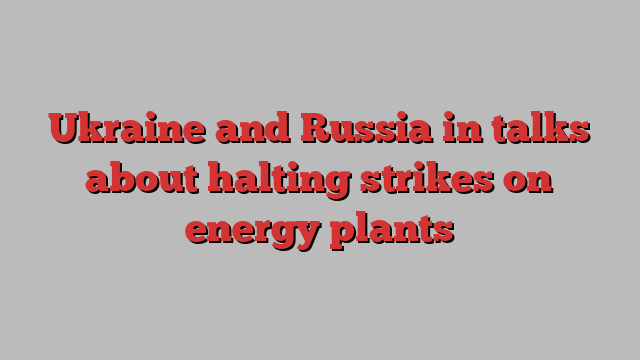
Ukraine and Russia are in preliminary discussions about halting strikes on each other’s energy infrastructure, according to people familiar with the matter.
Kyiv was seeking to resume Qatar-mediated negotiations that came close to agreement in August before being derailed by Ukraine’s invasion of Kursk, said the people, who included senior Ukrainian officials.
“There’s very early talks about potentially restarting something,” said a diplomat briefed on the negotiations. “There’s now talks on the energy facilities.”
An agreement would mark the most significant de-escalation of the war since Russian president Vladimir Putin ordered the full-scale invasion of Ukraine in early 2022.
Ukrainian President Volodymyr Zelenskyy said this month that a deal to protect energy facilities could signal a Russian willingness to engage in broader peace talks.
Moscow and Kyiv have already reduced the frequency of attacks on each other’s energy infrastructure in recent weeks as part of an understanding reached by their intelligence agencies, according to a senior Ukrainian official.
With winter approaching, Ukraine faces severe challenges due to the extensive Russian missile strikes that have decimated nearly half of its energy generation capacity.
The nation now relies heavily on its nuclear power facilities and energy imports from European partners.
Both Kyiv and Moscow have previously accepted that stopping attacks on Ukraine’s power grid and Russia’s oil refining capacity was in their mutual interest.
But Putin is unlikely to agree a deal until Russia’s forces oust Ukrainian troops from its Kursk region, where they still control about 600 sq km of territory, according to a former senior Kremlin official briefed on the talks.
“As long as the [Ukrainians] are trampling the land in Kursk, Putin will hit Zelenskyy’s energy infrastructure,” the person said.
Ukraine nevertheless plans to keep striking targets, including oil refineries, to pressure Russia into the talks, according to the senior Ukrainian official.
Beyond Kyiv’s long-range attack capabilities, which have allowed it to hit energy targets and military facilities inside Russia, “we do not have a lot of leverage to [force the Russians] to negotiate”, they added.
The Kursk invasion led to Moscow pulling out from a previous round of talks in August just as officials began planning an in-person meeting in Doha.
Qatar had started mediating those negotiations in June after Zelenskyy held a peace summit in Switzerland — to which Russia was not invited.
Dmitry Peskov, Putin’s spokesman, declined to comment. Zelenskyy’s office did not immediately respond to requests for comment.
Other attempts to broker a deal have also foundered in the past. Four Ukrainian officials told the Financial Times that Kyiv and Moscow had come to a “tacit agreement” last autumn to not strike each other’s energy facilities.
As a result, Russia that winter refrained from the type of large-scale attacks it had conducted on Ukraine’s power infrastructure in 2022-23, according to two Ukrainian officials and a person in Washington with knowledge of the situation.
That agreement was meant to pave the way towards a formal deal, the people said.
However, Kyiv restarted drone attacks on Russia’s oil facilities in February and March this year, as it sought to increase pressure on Moscow after its failed 2023 counteroffensive.
Despite a warning from the White House to stop the strikes, Kyiv pressed ahead, and Moscow viewed the tacit agreement as having been broken, people familiar with the situation said.
Russia then escalated, unleashing barrages of long-range missiles aimed at power plants across Ukraine, including the Trypilska thermal power plant 40km from Kyiv, which was completely destroyed.
As part of the Ukrainian campaign, at least nine of Russia’s 32 major refineries have been hit since the start of 2024.
Sergey Vakulenko at the Carnegie Russia Eurasia Center said that at the peak of the attacks in May, 17 per cent of Russia’s refining capacity was affected but that most of this had since been repaired.
Russia also exports a relatively small amount of refined oil products and the country’s refining capacity is more than double its fuel consumption.
Russia’s response to Kyiv’s attacks plunged much of Ukraine into temporary darkness and cut 9GW of power generation capacity — half of what Ukraine needed last year to get through winter. Kyiv has proved unable to fully restore this capacity.
Putin said last week that Russia was only prepared to consider “any variations of peace agreements based on realities on the ground”.
He has previously demanded that Ukraine surrender full control of four front-line regions that Moscow only partly occupies, as well as a complete rollback of western sanctions. Ukraine considers those conditions a non-starter for any potential peace talks.
Putin said that Turkey, which helped mediate a failed effort to negotiate an end to the war in the spring of 2022, had recently offered new peace proposals that Ukraine immediately rejected. “Clearly they’re not ready yet. The ball’s in their court,” the Russian president said.
Additional reporting by Anastasia Stognei in Tbilisi